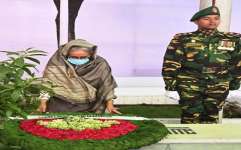Bangladesh fails to fully implement CHT Peace Accord in 23 years
The process of implementing the Chattogram Hill Tracts Peace Accord signed 23 years ago has remained stalled as ‘some quarters’ are out to keep the three hill districts restive, according to ethnic and rights groups.
No decision taken in meetings in 2019 and 2020 as a part of implementation of the agreement was implemented, Parbatya Chattogram Jana Samhati Samiti said in a document prepared in October on state of the implementation of accord and situation in the CHT.
‘The implementation process of the Chattogram Hill Tracts Peace Accord has remained halted as some quarters are active to ensure the non-implementation of the agreement,’ Chattogram Hill Tracts Regional Council member KS Mong Marma told New Age over phone on Tuesday.
‘The government has made statements claiming full implementation of some provisions of the agreement, but there has been huge gaps and loopholes in the process,’ he said.
He pointed out that the CHT affairs ministry has no authority to work towards implementing the provisions of the accord.
The AL-led government signed the peace pact on December 2, 1997, for ending armed conflicts between the ethnic communities and security forces, ensuring protection of their land rights, and the revival and conservation of their cultural uniqueness.
The accord was also aimed at rehabilitating the people displaced due to conflicts and repatriation of those who had left the country, limiting the presence of security forces and setting up regional and district councils headed by representatives of the ethnic communities.
Abul Hasanat Abdullah, then chief whip of the Jatiya Sangsad and convener of the National Committee on Chittagong Hill Tracts, signed the accord on behalf of the government in the presence of then prime minister Sheikh Hasina.
President Md Abdul Hamid and prime minister Sheikh Hasina issued separate messages marking the 23rd anniversary of CHT peace accord.
Abdul Hamid called upon all irrespective of party affiliations to work together to harness the potentials of the hill districts.
The prime minister sought cooperation from all for full implementation of the CHT peace accord.
The Prime Minister said the post-1975 undemocratic governments (after the assassination of Bangabandhu) had created divisions between the Bangalee and the hill people for their self-interest instead of maintaining social stability there, state-run news agency Bangladesh Sangbad Sangstha reports.
Killings, tortures and injustice, grabbing of lands and wealth and misuse of the state resources had made the region more unstable, she added.
Jyotirindra Bodhipriya Larma, better known as Santu Larma, who heads the Parbatya Chattogram Jana-Samhati Samiti signed the instrument on behalf of the ‘residents of the Chittagong Hill Tracts’.
The PCJSS said that resolving the disputes on possession of land by settlers, making the land commission functional, identify non-ethnic permanent residents, placing law and order under local bodies, withdrawing security forces, transferring hill matters to the regional and hill district councils, rehabilitation of returnee ethnic families and general clemency for ethnic individuals charged with secessionist offences before signing the accord were not fully implemented.
KS Mong, also a central leader of the PCJSS, said that the CHT affairs ministry, which was installed after the accord, has become merely ‘a post office’ for forwarding letters from three districts to other ministries and departments as demand for amending the allocation of business for the ministry in line with the accord are yet to be met.
The regional and local government bodies, including the district councils, are yet to have full authority on many issues, including employing teachers at the primary, secondary and high secondary levels in line with the agreement.
There are other serious issues, he said, several quarters are busy encroaching on the hills, forests and natural resources and they have been opposing the implementation of the agreement for years.
Describing the situation in the CHT districts as ‘complex and tensed,’ KS Mong said, ‘The CHT districts have been in the throes of a political crisis which is highly unlikely to be resolved by military interventions. It requires direct intervention from prime minister Sheikh Hasina.’
The CHT districts have remained one of the most unstable areas in the country with scores of ethnic and non-ethnic people being killed in attacks and counter-attacks by rival groups every year due to the non-fulfilment of the accord, local people and rights groups observed.
Bangladesh Indigenous Peoples’ Forum general secretary Sanjeeb Drong too said that there was no progress in the past one year in almost all areas, including land reform implementation though there were repeated assurances from the government.
Namita Chakma, a human rights activist, said that the hill districts have become restive ‘due to evil politics, which is unfortunate, according to our correspondent in Khagrachhari.
When contacted over phone on Monday evening, Chattogram Hill Tracts affairs minister Bir Bahadur Ushwe Sing declined to comment on the state of implementation of the peace accord.
The government is in the process of implementing the peace agreement, Abul Hasanat Abdullah, the current convener of the committee to implement the accord, said.
Several local ethnic groups, including United Peoples Democratic Front, and then main opposition in the parliament Bangladesh Nationalist party opposed the accord.














